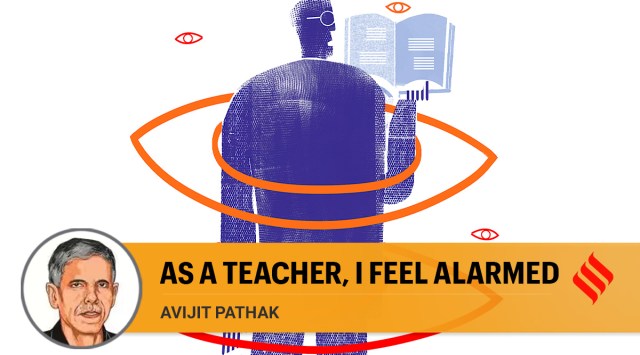
The primary reason I could celebrate the vocation of teaching for more than three decades was the vibrancy of the dialogic classroom — a space enriched by nuanced conversations, reflections on multiple ways of seeing, the art of listening, or the willingness to expand one’s mental/intellectual horizon.
My students often disagreed with me, and in their own ways interpreted my philosophic location. For instance, some Marxist students would say that I am a Gandhian; and some Ambedkarite students would remind me of my “caste privilege”, and why, as they would think, I cannot understand the gravity of the caste question in Indian politics and society. Not solely that. I would also be seen as someone inclined to the “new left” school of thought because of my references to Theodor Adorno, Herbert Marcuse and Erich Fromm.
However, despite these differences or disagreements, there was no animosity. After class, we could sit together in the university canteen and enjoy our cups of coffee. There was no police complaint, no FIR, no viral video. In other words, there was some sanctity in the teacher-student relationship; there was mutual trust; and the classroom was not a site of surveillance.
Possibly, I was lucky. I retired at the right time. Now we live in altogether different times. A student can shoot a video of the classroom discussion, and make it “viral”. And in an age when religious or “nationalist” sentiments are hurt so quickly, a teacher’s somewhat complex opinion can be seen as an offence. An FIR can be filed, and he/she can be arrested.
Think of what has happened in Pune. The police arrested a teacher of Symbiosis College of Arts and Commerce on charges of hurting religious sentiments. And the college suspended him for making alleged “objectionable” remarks about Hindu deities in a class. Ashok Sopan — a Hindi teacher — was communicating with the students of Class XII. The purported video — shot by a student — went viral on social media. It showed the teacher drawing parallels between Hindu deities and Islam and Christianity. He was trying to convey the message that “God is one”. And it did not take much time for a member of a militant Hindu organisation to file a complaint against the teacher. The Pune police charged him under IPC Section 295A — “deliberate and malicious acts that are intended to outrage religious feelings”.
As a teacher, I feel annoyed. An incident of this kind shows how we are destroying the spirit of learning and unlearning through questions, counter-questions, dialogues, conversations and differences. We are destroying what sustains a classroom — the efficacy of mutual trust. And we are destroying the spirit of studentship.
Think of these Class XII students of Symbiosis College of Arts and Commerce. They are young; they have just begun to see the world. It is the time to remain curious, keep their eyes open, read great books, see beyond the limited realms of caste and religious identities, expand their horizons, and find multiple ways of looking at life, culture and society.
In other words, there is some beauty in being a student; it is the ability to reflect, question, imagine and live with differences and a plurality of worldviews. However, when shining news anchors of toxic television channels become our educators, and the instantaneity of social media abhors critical thinking, it is not easy to celebrate the spirit of studentship. Great ideas are replaced by the demagogue’s loud rhetoric; and nasty sloganeering displaces poetry, philosophy and social sciences. We are turning our students into a non-reflexive crowd with a herd mentality.
Furthermore, when the politics of hyper-nationalism with the aggression of religious identity enters our schools, colleges and universities, everything changes. While principals and vice-chancellors are expected to play the role of the protectors of the dominant “nationalist” discourse, teachers are expected to be one-dimensional and docile conformists. The result is the absence of critical pedagogy; and what prevails is an environment of fear, suspicion, and surveillance. The classroom is destroyed. The grace in the teacher-student relationship becomes a thing of the past.
Imagine that as a teacher you are urging your students to decipher the meaning of Friedrich Nietzsche’s declaration: “God is dead”. Imagine you are persuading your students to reflect on Kabir’s saying: “I am neither in Kaaba nor in Kailash/Neither am I in rites and ceremonies, nor in yoga and renunciation.” Imagine you are urging your students to understand the significance of Gandhi’s prayer meetings in 1947-48. Imagine you are singing “Ishwar Allah Tere Naam”. Who knows, an FIR could be filed against you, and your employer might not think twice before suspending/expelling you.
The resultant environment of fear is destroying the culture of learning. There are moments when I feel it will become increasingly difficult to teach meaningful social sciences/humanities in our classrooms. If, as a teacher, you become overly cautious before you utter a word; if you apprehend that a student is recording your lecture, or taking a video; or the administration is continually monitoring your every move, how can you teach Marx, Gandhi, Ambedkar, Tagore, Iqbal, Manto and Premchand freely, spontaneously and creatively? And when classrooms die, democracy dies.
Will the larger teaching community realise that what has happened to Ashok Sopan can happen to anybody in any other college/university? Will they stand up, raise their voice, and critique the all-pervading decadence? Or will they remain silent and play it “safe”?
The writer taught sociology at JNU from 1990-2021